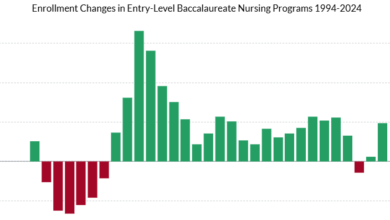Digital nursing: the global outlook and impact on nurses

The digital revolution is well underway in healthcare systems around the world, and active engagement with technology is going to be an increasingly essential aspect of nursing going forward, according to a new position statement from the International Council of Nurses (ICN). Nursing Times has spoken to one of its key authors.
In the statement, the ICN said digital health technologies had the potential to deliver more equitable access to health services, more efficient and reliable healthcare systems, improved safety for both patients and health professionals, reduced workforce pressures, lower costs and, ultimately, improved health outcomes around the world.
“I don’t think that health and healthcare could continue without nurses being on board with digital health technology”
Erica Burton
However, the influential global nursing body made clear in its statement, published in September, that nurses must be involved at every stage of the development and implementation of digital healthcare technologies, if they are to achieve these goals.
Erica Burton, a senior policy advisor on nursing and health policy at the ICN, who led the work on the position statement, told Nursing Times that the speed at which new technologies were being introduced into healthcare settings meant that there was no time to waste in getting to grips with the issue.
“We cannot delay addressing how nurses engage with digital technology,” she said. “We’ve seen over the last two decades a rapid rise in use of digital technology.
“It’s a really crucial time to get involved and to start understanding how this impacts our care and our day-to-day work.”
However, she noted that getting the more than 28 million nurses around the world up to speed with digital technology was going to be a “definite challenge”.
Current global state of digital nursing
Ms Burton said that, although increasing engagement with digital technology may be a daunting task on the international level, nurses in the UK and Canada, where she works, were already very familiar with many of the apps, devices and computer systems that fall under the umbrella of “digital health technology.”
“We think about digital technology as being these really fancy big AI-type interventions and tools, but actually it includes a lot of the tools that we are already using – like automated blood pressure equipment,” she said.
She cited the communications apps and telehealth programmes that were used by many nurses during the Covid-19 pandemic to provide virtual care to patients as prime examples.
Others already routinely used by nurses in richer countries included electronic health records (EHR), smart beds, and wearable devices such as continuous glucose monitors and automated IV pumps.
In addition, she said digital technology was starting to play an increasing role in nurse education where simulation technologies could help students bridge the gap between theory and practice, before they were thrown into a real clinical setting.
“These tools are there and we’re used to them, but, for a lot of nurses around the world, it is new technology,” noted Ms Burton.
A major concern for the ICN was around this “digital divide” between regions and countries that have access to modern information and communication technologies, and those that do not.
International telecommunications data shows that, as of 2022, 95% of the world population had access to a mobile broadband network, but 2.7 billion people still lacked reliable internet access.
Ms Burton said this meant the healthcare systems in poorer areas ran the risk of being left behind. “That gap between countries or areas could result in increased inequities in health outcomes as certain areas advance and others don’t,” she said.
“Really keeping the universal health coverage and the universal health access piece at the forefront as we advance is essential.”
Looking to the future
Looking to the future, Ms Burton said the digital transformation of healthcare should be of real benefit to nurses, helping them to deliver a better standard of care to a greater number of people in more places, more easily.
She said: “It can be used to support equitable and universal access to health services, for example, delivering services to people in remote locations can increase reliability and efficiency of care. It can improve patient and health worker safety.
“This is all with the understanding that we’re engaging with these technologies in a way that they are meant to be engaged with, and they are developed to meet the needs of both nurses and patients” she added.
Another key area that digital technology could address is the workforce shortage, through increased efficiency and improvements in nurse training, she noted.
“Technologies can support the expansion and scope of tasks that nurses are doing and increase efficiency simply through speed and cutting travel time to deliver certain types of nursing care,” she said.
Ms Burton said improvements to nurse training through using digital technologies should also help address the international nursing shortage.
“It’s enhancing nursing education, and this is going to contribute back to workforce shortages because, when nurses feel confident that they can deliver safe care, that is going to directly contribute to retention,” she said.
Also on education, she said that it was essential for digital healthcare training to be offered to nurses at every stage of their career, including undergraduate level and continuing professional development.
“We’re really at the point where we need to make sure that nurses are engaging with digital health and getting that competence,” she said.
But she said it was just as important for nurses to be involved in the development of new digital healthcare technologies at every stage, starting at the research level, to ensure that all digital applications and technologies that they use have been designed with nursing practice in mind.
“Nurses really know the needs of patients,” she said. “If you don’t have that nursing input as to what those needs are, then I don’t think that these technologies will end up serving their purpose, which is meeting the needs of people and communities and families.”
Involving nurses in design
Ms Burton recognised that there were obstacles that needed to be overcome before digital technology stood a chance of achieving its potential in healthcare.
Chief among these lay in the poor design of some currently available technologies. “A lot of the technologies haven’t been designed with nursing in mind, so they [don’t] work for nursing,” she said.
Some digital tools that are designed to solve a science-based problem without input from nurses, do not fit easily into actual care pathways, she said, adding: “In that regard, the human element is sometimes lacking.”
Ms Burton identified EHRs as an example of digital health technology where poor design often hampered its usefulness. “In my clinical job, I struggle with the EHR system every single shift,” she said. “And I’ve been using it for almost five years!”
There is also a broader concern that technologies are being developed without enough focus on interoperability between systems and the need for shared international standards.
“The risk is that there is a lack of sharing internationally and interoperability,” she said. “This is an area that could become really disjointed. If we are all using information differently, then that information is not as valuable as it could be. And it’s not as reliable either.”
To avoid this, the ICN has recommended that digital health technologies should use an international terminology standard such as the International Classification for Nursing Practice.
The second obstacle to be overcome if digital technology was to live up to its promise was the reluctance among some healthcare workers, who remain sceptical about the benefits of new technologies in healthcare.
“Not everyone is on the same page,” Ms Burton pointed out, highlighting that some nurses still needed “to get on board”.
She said that, if nurses do not support the culture of digital technology use, and do not start making the effort to keep up with the necessary skills and knowledge to use it, then it will be harder for them to engage with more complex technologies in the future, with potentially dire consequences.
Ms Buton added that nurses also needed to be aware of ethical concerns around the use of new digital technologies in healthcare.
“We need to look out for the inappropriate use of technology and how that might play into professional standards,” she said.
It was essential for nurses to be involved and engaged with digital technology, she suggested. “We are the largest group of health professionals in the health system,” she said.
“Quite frankly, I don’t think that health and healthcare could continue without nurses being on board with digital health technology. It just won’t be safe and efficient.”





